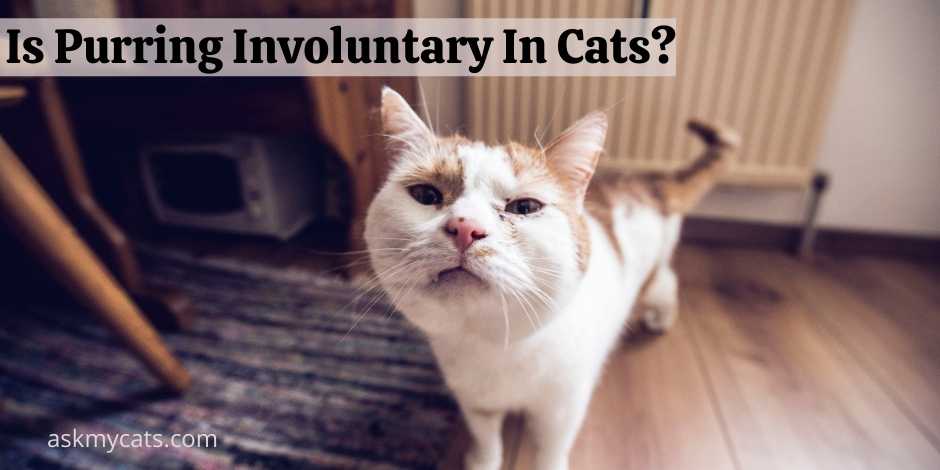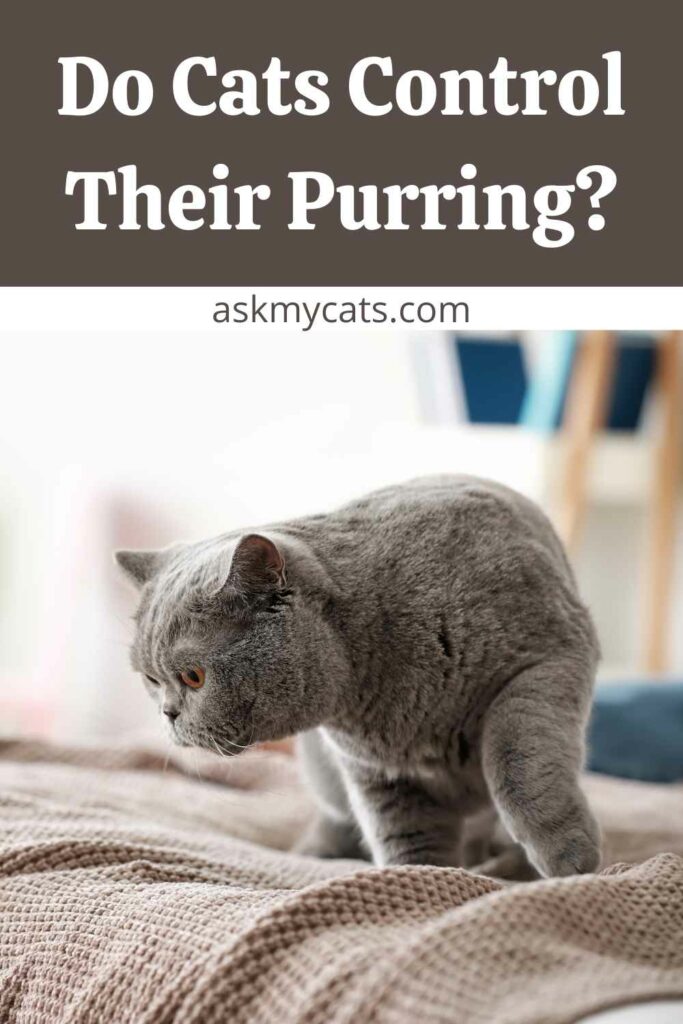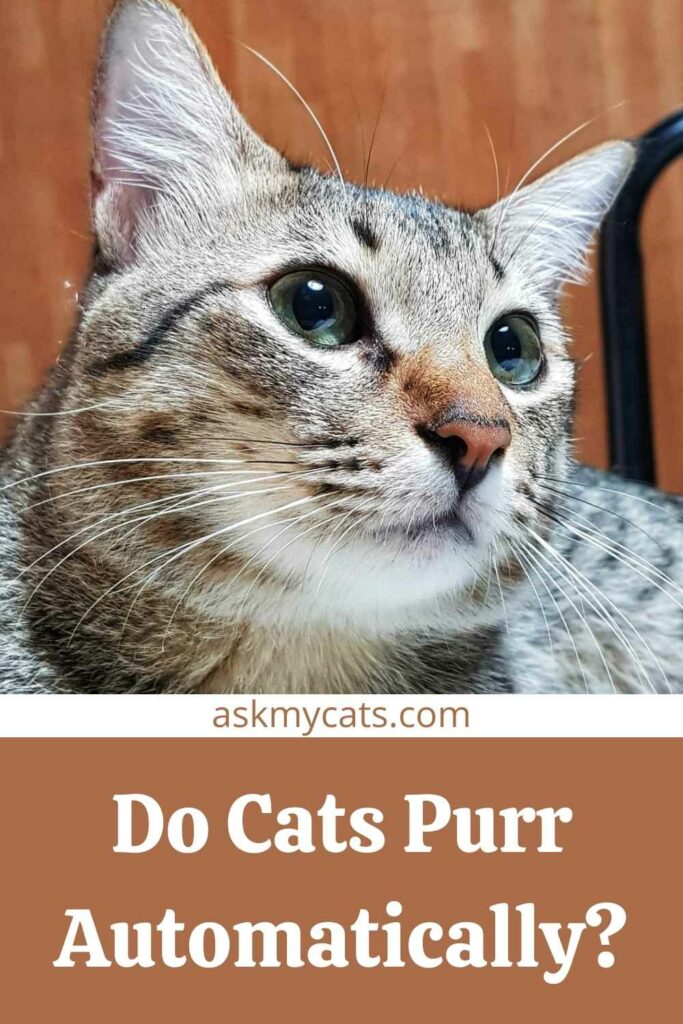The purr is produced by cats by intermittent signaling of the laryngeal and diaphragmatic muscles. They purr with a constant rhythm and frequency ranging from 25 to 150 Hertz during both inhalation and exhale.
Several studies have found that sound frequencies in this range can increase bone density and aid healing.
Cats may communicate with humans in a variety of ways, one of which is purring. Purring is generally an instinctual and involuntary reaction, and cats do it when they’re happy or need to settle down, but cats can also purr when they need something from humans.
If you want to learn more about your cat’s purring mechanism and how much control they have over it, let’s not spend any more time and go deeper into the intriguing world of purring.
Key Takeaways
- Cats can control their purring to some extent.
- Cats can increase the volume of their purring at will, and they do so when it is beneficial to them.
- The purring sound is created by the rhythmic contraction of the laryngeal and diaphragmatic muscles.
- Several studies have found that sound frequencies in this range can increase bone density and aid healing.


Give Your Cat the Perfect Day
Get the Free Ebook!
Do Cats Control Their Purring?
Yes, cats can control their purring to some extent.

If cats can actually manage their purrs, we may consider this sound to be another type of communication.
It’s also evident that when our cats purr, it’s just for those close enough to hear and feel it because the frequency and volume are too low to travel, so what are they attempting to tell us?
Purring is usually generated by juveniles, although it can also be produced by adults in favorable (relaxed, friendly) circumstances such as nursing/suckling, mutual grooming, courting, or a pleasant approach.
This is most certainly a voluntary type of purring used by cats to communicate happiness, especially if their general behavior indicates that they are healthy and happy kittens.
While the purrs of my cats never fail to astonish me, some experts believe that there is a unique soft kitten chant that is purposefully this seductive. Cats may make several types of purrs, just as they can produce multiple types of meows.
The purr of contentment sounds more like the sound kittens made when nursing, however, there appears to be another sort of purr that involves a high-pitched note that is comparable in frequency to a scream but not as loud.
If you have a cat, I’m sure a purring feline on your lap or at your side is nothing new to you, and it can always flip a frown upside down!
I mean, when they make this sound, they’re most likely comfortable and enjoying your presence as well as some thorough petting.
So, is there a link between feeling good and purring?
An investigation of the sound revealed that cats used this purr to request food or other favors from their caregiver, and it appeared to work most of the time since the cry evokes a caring reaction.
Cats can increase this almost-hidden element of purring at will, and they do so when it is helpful to them.
In other words, our cats have us wrapped around their little paws with their particular purr, and I don’t see what’s wrong with that!
Interesting Read: Why Does My Cat Purr While Playing?
Do Cats Purr Automatically?
Yes, cats can purr automatically.

Most feline and non-feline actions can be deliberate, involuntary, or both, with purring falling under the latter group. Just consider it! It would be crazy if our cats could only have one sort of purr sound that could only be used once.
Now that we’ve learned how deliberate purring works, let’s look into its less voluntary role.
Purring is usually linked with a happy cat, as an indication of its affection for its human and other animals, however, a cat may also purr when they are unhappy.
Purring is typically used as a coping technique by our feline pets when they are not feeling well, either psychologically or physically.
When I’m feeling worried, I utilize my cat’s purring as a relaxing sound, but although I do this intentionally, our cats most likely turn on their anti-anxiety purr naturally.
It’s not always possible to distinguish between a joyful and a self-soothing purr until we consider the conditions as well as our cat’s general health and contentment.
You may have seen your cat purring while they are under pressure, which is common in the vet’s office. Moving house, or a new addition to your families, such as a spouse, a baby, or another cat, can cause jealousy, and your cat may hide, become sluggish, or even violent.
Interesting Read: Why Do Cats Purr While Eating?
That is why you should not depend on your cat’s purring as an indication of contentment because it is most likely not a deliberate positive message in such situations.
That’s why it’s critical to enhance their environment, make any changes less stressful, or hire a cat behaviorist to help them feel better and regain their joyful purr.
When our cat is nervous, his brain makes this lovely and comforting sound, but the study reveals that purring is more than just a mental self-soothing mechanism; it also helps cats recover physically faster.
An accelerometer was used to detect domestic cat purrs in research, and it revealed that cats produced strong frequencies between 25 and 150 Hz, as well as fundamental, dominating, or powerful frequencies at exactly 25 Hz and 50 Hz.
These are the two low frequencies that stimulate bone development and fracture healing the best.
Purr frequencies are vibrational/electrical frequencies that are used to cure bone growth/fractures, pain, edema, muscle growth/strain, joint flexibility, dyspnoea, and wounds.
Having both predator and prey roles in their natural environment, this type of healing mechanism is a significant feline advantage.
Not only does it increase their chances of survival in the event of an accident or attack, but it may also assist preserve their bones from becoming weak and brittle due to their sedentary lifestyle.
Purring is also linked to the production of endorphins, which occurs when our cats experience both pleasure and pain, and endorphins work as painkillers. This means that, like morphine, this instinctive response to discomfort serves to reduce the sense of pain.
So, not only do our cats purr automatically to mend their bones and fractures, to develop muscle, and to repair tendons, but they also purr to relieve pain, during delivery, and just before death.
Interesting Read: Why Does My Cat Lay On Me And Purr?
Do Cats Choose When They Purr?
Yes, cats can choose when they purr because it is both a voluntary and involuntary response.

When cats are satisfied, they purr. You may hear a soft rumbling as they breathe in and out while yours is curled up in the sun. When you touch them, you feel a slight quiver. It’s almost as though they’re sending out calm waves.
When it’s time to eat, some cats purr. British researchers investigated the sounds that domestic cats produce when they are hungry and when they are not. The purrs aren’t the same.
When cats purr for food, they mix their typical purr with an unpleasant scream or mew, which sounds similar to a human baby’s cry.
According to experts, humans are more inclined to respond to this sound. They discovered that even if they don’t own a cat, people can recognize the difference between purrs.
This sound is said to assist strengthen the link between kittens and their mothers since they all purr at the same time, and it also lets the mother know that her offspring are safe and sound.
It’s unclear whether kittens have control over their purrs from the start; perhaps they do so in response to their mother’s purr, or perhaps their instincts take over first, and as they grow and learn more about the world around them, they gradually gain complete mastery over their purrs, and before they know it, they’re using them for their own benefit!
Must Read: Cat Purring Effect On Humans: The Power of Cat Purring
Why Is My Cat Purring Uncontrollably?
Your cat is purring uncontrollably because they are in pain.
Some experts believe that the purr is also a therapeutic function. Cats purr with a frequency of 25 to 150 hertz during both inhalation and expiration.
Sound frequencies in this range have been found in studies to enhance bone density and facilitate healing.
Feline bones mend significantly faster than those of other mammals, and in human medicine, a vibration with a frequency close to that of the purr appears to hasten healing.
Interesting Read: Why Does My Cat Purr And Bite Me?
Do Cats Decide To Purr?
Cats can decide to purr sometimes.
When cats are in a peaceful setting, they will purr, sending off waves of tranquility. This can also happen when you brush them, indicating that your feline companion is joyful or social.
Cats, on the other hand, purr to express a variety of emotions and demands. If you pick up your cat, for example, they will purr either because they enjoy it or because they are afraid.
Some of the Interesting reads regarding cat purring:
- Why Do Cats Purr? The Science of Cat Purring
- Why Doesn’t My Cat Purr?
- How To Make A Cat Purr?
- Why Do Cats Purr When They Are Dying?
- Do Cats Purr When They Sleep?
- Why Does My Cat Purr When He Sees Me?
- Why Is My Cat Purring So Much?
- Why Does My Cat Purr So Loudly?
- Why Do Cats Purr When You Stroke Them?
- Differences In Purring Between Cat Breeds
- Do Cats Purr When They Are Happy?
- Do Cats Breathe Faster When Purring?
- Why Do Cats Purr When You Talk To Them?
- Why Do Cats Wag Their Tails While Purring?
- Why Does My Cat’s Purring Sound Congested?
- How To Purr Like A Cat?
- Why Do Cat’s Noses Get Wet When They Purr?
- Why Is My Pregnant Cat Purring So Much?
- Why Do Cats Purr And Knead?
- Do Cats Purr When They Are Sick Or In Pain?
- Do Feral Cats Purr?
Frequently Asked Questions
Do cats have control over purring?
Your cat’s central nervous system does not regulate the impulses that instruct her to purr, which means she has the finest autopilot setting known to humans.
Is a cat purring a learned behavior?
Purring is a natural habit in cats, but it may also be trained. Kittens are deaf and blind when they are born, but they can detect their mother’s vibrations. They then learn to return the purr to their mother. When presented with something unpleasant, such as a trip to the vet, the same cats may purr.
What does excessive purring in a cat mean?
Although our cats purr to signal contentment, they may also purr when they are scared, nervous, or seeking to communicate other needs, such as if they are in pain or uncomfortable. In fact, when a cat is in discomfort, its purring may increase.
Final Words
The purring sound is produced by air hitting the vibrating laryngeal muscles in the cat’s throat as it breathes in and out. Despite the autonomic reactions, cats have cognitive control over purring.
Cats who have the greatest one-on-one interaction with their owners, rather than those who live in large families where purring could be drowned out by the overall commotion, appear to be the most likely to utilize manipulative purrs.
Drop your questions in the comments section below.
Interesting Read: Why Does My Cat Drool When He Purrs?
Interesting Read: Do Older Cats Purr More or Less?
